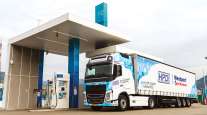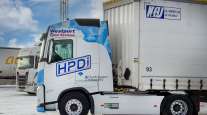Westport Plans Update to Nat-Gas Technology
This story appears in the Dec. 23 & 30 print edition of Transport Topics.
Westport Innovations said it will partner with truck and engine manufacturers to deliver the next generation of its natural-gas engine technology.
The company said it plans to offer the updated version of its high-pressure, direct-injection technology, dubbed Westport HPDI 2.0, by integrating its systems with OEM engines.
“As the potential for natural gas is now apparent in all global vehicle and off-road markets, HPDI 2.0 will allow OEMs to introduce high-performance, fully integrated products that match state-of-the-art diesel performance but can be produced without expensive and challenging investments in facilities, product development and testing,” Westport CEO David Demers said in a statement on Dec. 10.
The company said it anticipates engines with the updated technology will.become available in late 2014.
Brad Douville, vice president at Westport, said OEMs will install the HPDI components in their own truck and engine factories.
That’s a departure from the way Westport has delivered its previous product, a 15-liter liquefied natural gas engine that was discontinued in November.
To produce that engine, which was available in Kenworth and Peterbilt trucks, Westport had Cummins engines shipped to its facility in British Columbia to outfit them with HPDI systems.
That approach was an “arduous and not particularly cost-effective path to market,” Douville said.
“Our expectation is that [the new OEM integration] will be competitive with the price points currently being established by the 12-liter Cummins Westport product,” he said.
In the announcement, Westport said HPDI 2.0 is in development with “a number of global OEMs,” but it did not specify which ones.
Douville said the company is talking with all of the North American heavy-duty truck makers.
One of them, Volvo Trucks, previously announced it is developing a proprietary 13-liter compression-ignition engine powered by liquefied natural gas.
Ed Saxman, Volvo Trucks’ product manager for alternative fuels, said Westport is a supplier involved in that product’s development, but he added that Volvo “cannot discuss details of the project at this time.”
The company plans to have limited availability and production of the D13-LNG engine in 2015, he said.
The Volvo engine “will deliver increased range and significant fuel-efficiency improvements compared with other natural gas-powered offerings,” Saxman said.
Integrated HPDI engines would expand the lineup of natural-gas truck engines available in the North American market, joining the 9-liter and 12-liter spark-ignited engines offered by Cummins Westport, Westport’s joint venture with Cummins Inc.
“We see it as a very nice complement between the Cummins Westport existing product line and the OEM engines using HPDI,” Douville said. “They do address different market segments and different kinds of customer needs.”
The spark-ignited Cummins Westport 12-liter, combined with a 13-liter HPDI engine offering, would create “a nice portfolio for a truck OEM,” he said, and HPDI 2.0 features several enhancements over the technology used on the discontinued 15-liter engine.
“Every single component was redesigned and redeveloped with scalable manufacturing in mind,” Douville said. “There was also further effort in integrating the components on the engines themselves.”
Engines with Westport’s HPDI technology run on about 95% natural gas plus a small amount of diesel as a pilot fuel.
The discontinued 15-liter engines used LNG, but the architecture for HPDI 2.0 can support either LNG or compressed natural gas, Douville said.
Like their predecessors, he said, engines with the new HPDI systems still will use diesel particulate filters and selective catalytic reduction to meet federal emissions standards, unlike spark-ignited natural-gas products.
HPDI engines, however, are 15% to 20% more fuel-efficient than spark-ignited engines, he said, adding that HPDI engines also can provide similar horsepower and torque ratings as a diesel engine of the same size.
New HPDI engines would fill a gap in the natural-gas truck market for operations that require high horsepower and torque, Douville said.
Meanwhile, natural-gas fuel supplier Clean Energy Fuels Corp. recently signaled that the natural-gas truck market is accelerating.
It said its customers ordered 70% more natural-gas vehicles in the first nine months of 2013 than they did during the same period in 2012.
Those figures demonstrate a “pronounced trend toward natural gas as a transportation fuel,” Clean Energy CEO Andrew Littlefair said in the Dec. 12 announcement.




